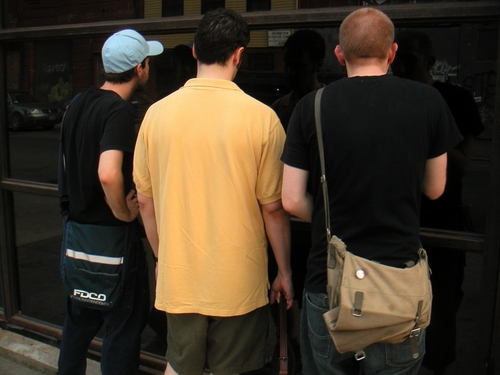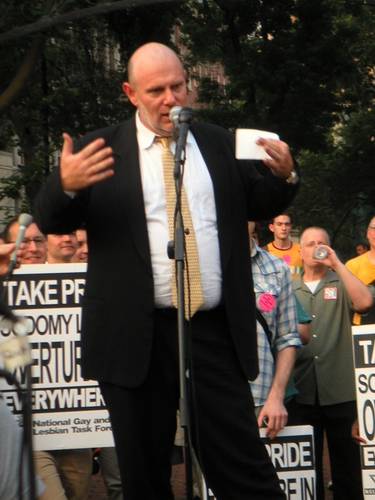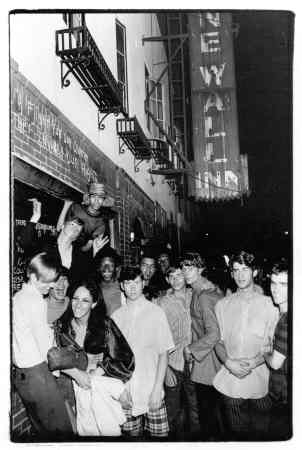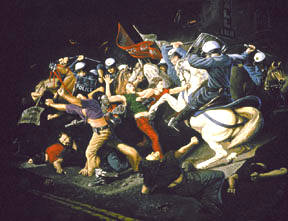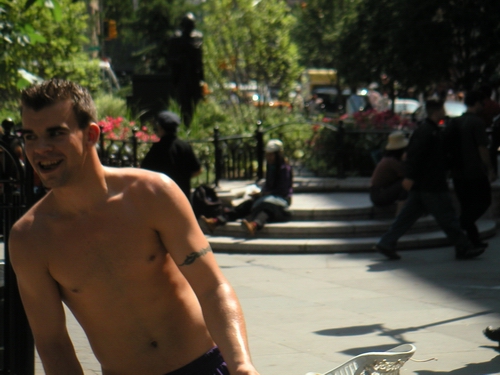Something's fucked-up about the way we depend upon the narrowly-argued politically-subjective legal-precedent search exercises of nine lifetime appointees (arbitrary lifespans, arbitrary appointments) in order to advance (or, in recent years much more likely, retreat) on social issues.
Other nations normally use a legislative reponse to meet changes in the demands and needs of an enlightened, maturing (maybe that's the problem) population, but our own legislators have nullified themselves through corporate subsidies and their fear of being identified with actual issues.
Examples? Just three for now: Abortion rights, queer rights, information rights.
Today information rights are in the news. Yesterday the Supreme Court not-so-narrowly (6-3) ruled that the nation's libraries must use Internet "pornography filters" if they accept federal financial support. In 2001 Congress had passed the statute upheld yesterday, titled "The Children's Internet Protection Act." The actual employment of the act had been blocked until now by a lower court ruling.
What this means is that the American Radical Right, which has dominated public policy for years, has scored another victory. A majority of Justices is now on record in believing that porn is only for the decadent rich (much in the way safe abortion and easy homosex has always been available for those same fortunates - and will continue to be, even if the Court moves to restrict these rights further).
Often overlooked in the discussion of Internet censorship is the fact that these "filters" do not tell us anything about what is being filtered out (what is it that is being kept from us?) and the fact that these systems simply don't work.
Both sides in the debate did appear to agree on one thing: the software that the government is requiring is far from perfect.
"Filters don't work," said Maurice J. Freedman, director of the Westchester Library System in the suburbs of New York City and president of the American Library Association. "And they're not going to work any better because the Supreme Court says libraries have to install them."
He cited a number of cases in which filters have blocked inoffensive information because search terms set off the protective software, including references to the poet Anne Sexton, Super Bowl XXX and Dick Armey, the former House majority leader.
My partner Barry, using an analogy, asked how anyone would accept a filter which might eliminate your email spam but also destroy a good percentage of your legitimate incoming messages at the same time. You wouldn't, you don't, and libraries shouldn't either.
Early reaction from librarians and others is pretty revealing.
On the one side there are the courageous custodians of all of human experience, like Emily Sheketoff, who will maintain their integrity even in an era of severe budget cuts.
Some libraries may decide to forgo federal financing if the alternative is filtering, said Emily Sheketoff, executive director of the Washington office of the American Library Association. "Some library boards have already decided that they are not going to offer their library patrons second-rate information," she said. `They are going to make sure that their library patrons get access to the same quality of information that rich people get at home."
On the other side, there are those who wish to keep the world in the dark. Representative Ernest J. Istook, a Republican of Oklahoma who was an author of the bill, enthused,
"The Supreme Court upheld the thrust of the law." Because of the decision, Mr. Istook said, "libraries can still be safe places for parents to drop off their kids."
In the middle, but because of its source, perhaps even more digusting than Istook's statement, is the quote from Ginnie Cooper, the executive director of the Brooklyn Public Library:
"The real goal is for the people who use the library to get what they want and need, and not be getting what they don't need [my italics]," Ms. Cooper said. "We'll do our best to find, within this new rule, how it is that we can do that."
Who is it who tells people who don't have their own computers "what they don't need"?
Finally, but something more that a postscript, this note: While under the federal act an adult can ask the librarian to turn off the "filtering" software, as at least some supporters, and even some opponents, of the law point out, that means that library patron Doe must explicitly ask to see the "Adult" version of the Internet - not an easy step for many people around the country.

